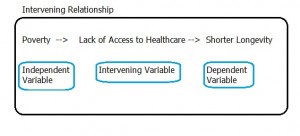Types of Variable > Intervening Variable
What is an Intervening Variable?
An intervening variable is a hypothetical variable used to explain causal links between other variables. Intervening variables cannot be observed in an experiment (that’s why they are hypothetical). For example, there is an association between being poor and having a shorter life span. Just because someone is poor doesn’t mean that will lead to an early death, so other hypothetical variables are used to explain the phenomenon. These intervening variables could include: lack of access to healthcare or poor nutrition.
In psychology, the intervening variable is sometimes called a mediator variable. In statistics, an intervening variable is usually considered to be a sub-type of mediating variable. However, the lines between the two terms are somewhat fuzzy, and they are often used interchangeably.
Limitations
Intervening variables are hypothetical constructs like personality, intelligence or attitude. As they are not “real” variables, one major limitation is that they cannot be measured. It is therefore impossible to quantify how much of the experimental results are due to the independent variables, and how much are due to each of the intervening variables.
Intervening and Independent/Dependent Variables
Boston University defines an intervening variable as “A control variable that follows an independent variable but precedes the dependent variable in a causal sequence.” So you could also look at intervening variables in terms of the independent variable and dependent variable; the intervening variable intervenes or mediates between the two. In the longevity example above, the independent variable is money (or lack of) and the dependent variable is longevity. Lack or access to healthcare or poor nutrition intervene, or fill the gap, between the independent and dependent variable.
 .
.
History
The term intervening was first used for variables by behavioral psychologist Edward C. Tolman in 1938 during studies on rat behavior for food rewards. He suggested that hunger was an intervening variable (it could not be observed during the actual experiments). Tolman’s work on intervening variables was an extremely important contribution to cognitive psychology as the concept made it possible to consider and measure unseen behaviors. Source: (a2zpsychology.com, 2002)
An intervening variable is also called a mediating variable or intermediary variable.
Check out our YouTube channel for hundreds of basic statistics videos.
References
(n.d.). Edward c. Tolman. Retrieved Dec 12 2016, from www.a2zpsychology.com Web site: http://www.a2zpsychology.com/great_psychologists/edward_c_tolman.htm